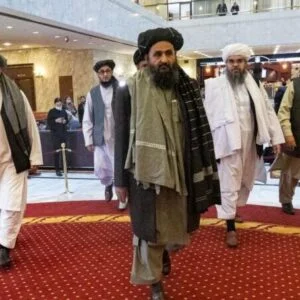The sudden and dramatic fall of Afghanistan to the Taliban in a matter of days may have come as a rude shock to the world, but it came as most shocking to New Delhi, which is situated in perhaps the most dangerous geopolitical region. This region is characterised by three nuclear-armed states with two Asian military behemoths. What is more concerning for New Delhi is the potential spillover effects that the events in Afghanistan would have on the security situation in India, particularly in the states bordering Pakistan such as Punjab, Jammu & Kashmir, Rajasthan, etc.
A Sino-Islamic Alliance
This potential camaraderie between Kabul, Beijing and Islamabad is giving credence to the theory of clash of civilizations propounded by the late Harvard University political scientist Samuel P Huntington. Huntington in his magnum opus book ‘Clash of Civilizations & the Remaking of the World Order’ had prophesied that owing to western and oriental arrogance there could be a possibility of a Sino-Islamic alliance to take on the West and its allies, including their social and political institutions, and their very way of life, in the future with the aim of dismantling the latter.
This was predicted by the author back in the 1990s which has come true and it’s threatening to alter the geopolitical and social landscape of South Asia particularly. China will be particularly keen to fill in the vacuum created by the American withdrawal from Afghanistan by offering itself as the best friend to the new dispensation in Kabul. The fact that the Taliban spokesman Zabiullah Mujahid in a press conference favoured Afghanistan’s entry into the Belt and Road Initiative (BRI) is indicative of the Sino-Islamic alliance taking shape.
India – The Prime Target
Afghanistan’s fall to the Taliban is being perceived in Indian strategic circles as a nightmare for New Delhi. Earlier, India faced the prospect of a two-front war – one with Pakistan on the northern and northern-western front and with China on the north-eastern border, but with the Taliban firmly in control of Kabul, there is a distinct three-front threat. Pakistan is desperate to keep the Kashmir pot boiling to regain strategic depth vis-a-vis India, and the new dispensation in Kabul has emboldened them.
More concerning is the fact that in the Taliban cabinet, the top positions have been given to the Haqqani network members who are virulently anti-India. This group has carried out attacks on Indian installations, most notably on the Indian embassy in Kabul in 2008. Hence there is no doubt that a new axis of evil – China-Pakistan-Taliban – may target India to fulfil their goal of establishing dominance in South Asia by fair or foul means.
Developing A New Strategy
Given the gravity of the situation, it is imperative that New Delhi craft a new security-military strategy to deal with this new potent threat. The strategy could include the following elements:
Firstly, aggressively mount diplomatic outreaches to like-minded nation-states of the world to not give legitimacy to the Taliban. In fact, India must be firm that unless the human rights and the democratic liberties of ordinary Afghan citizens are respected and duly given, the Taliban cannot hope to have cordial ties with India.
Secondly, India can add a new dimension to its diplomatic playbook by embarking on religious diplomacy, such diplomacy should focus on highlighting that Islam is a religion of peace and that there is no place for violence. Given the fact that India shares excellent ties with the Middle East countries, particularly Qatar, it can ask them to persuade the Taliban to change their hard-line puritanical version of Islam to a moderate version that respects modern democratic values. The Qatari model is an excellent example to emulate. This will also help in countering Pakistan’s export of radical Islam.
Thirdly, on the security front, India must be battle-ready, increasing defence spending & making aggressive defence purchases is the need of the hour. India must also strengthen its internal security, and step up coastal surveillance. Besides this, there needs to be a national political consensus on the new axis coming hard at India, and so there must be no room for complacency. Sharing intelligence and information, increasing the number of counter-terrorism exercises & strengthening international institutions like the FATF to check Pakistan’s terror funding and putting checks on it can go a long way in curbing Pakistan & China’s adventurism.
Conclusion
The events in Afghanistan are bound to have a deleterious impact on India sooner or later, hence India must be ready and on its guard. India hence needs to follow the advice of Henry Kissinger, former US national security advisor, who said, “Pragmatism triumphs idealism”.
– The writer is currently working as a Trainee Research Associate at Defence Research and Studies (dras.in) and is a columnist. The views expressed are personal and do not necessarily reflect the views of Raksha Anirveda
–The writer is currently working as a Research Associate at Defence Research and Studies (dras.in) and is a columnist. The views expressed are personal and do not necessarily reflect the views of Raksha Anirveda






